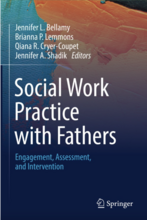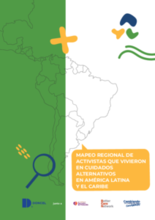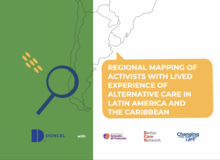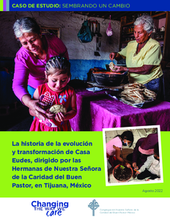This page contains documents and other resources related to children's care in the Americas. Browse resources by region, country, or category.
Displaying 241 - 250 of 3191
This chapter in the book "Engaging Fathers in Child Welfare and Foster Care Settings: Promoting Paternal Contributions to the Safety, Permanency, and Well-being of Children and Families" explores research on father engagement in child welfare services in the U.S., including studies on engagement activities, associations with child welfare outcomes, and barriers to engagement with the aim of assisting social workers and child welfare caseworkers in more fully engaging fathers.
Para garantizar que las personas que han vivido en cuidados alternativos puedan participar de los procesos y decisiones para mejorar los sistemas de cuidado, Doncel junto a la Red Latinoamericana de Egresados de Protección, Better Care Network y Cambiando la Forma en Que Cuidamos (Changing The Way We Care en inglés) llevaron adelante el primer mapeo regional de activistas que vivieron en cuidados alternativos en América Latina y el Caribe.
This is the first regional mapping of activists with care experience in Latin America and the Caribbean.
A team of professional researchers and young care leavers mapped the region to meet care experienced people engaged in improving alternative care in Latin America and the Caribbean and learn from their activism. They interviewed more than 60 care-experienced activists from 19 countries. On October 27 at 15.30 (EST) they will present the results of these efforts and dialogue with young activists to hear their recommendations to strengthen the participation of children, adolescents and youth in the issues that affect them.
In America, popular narratives about adoption tend to focus on happy endings. Poor mothers who were predestined to give their children away for a “better life”; unwanted kids turned into chosen ones; made-for-television reunions years later. Since childhood, these story lines about the industry of infant adoptions had gradually seeped into my subconscious from movies, books, and the news.
Rachel and her husband adopted Marcus out of Guatemalan foster care as a 7-month-old infant and brought him home to Lansing, Mich. With a round face framed by a full head of dark hair, Marcus was giggly and verbal — learning names of sea animals off flashcards, impressing other adults.
More than 100 Haitian migrants have been found on an uninhabited island near Puerto Rico, United States authorities said, as Haiti continues to reel from a humanitarian crisis brought on by surging gang violence.
JUAREZ, Mexico (Border Report) – Juarez authorities late Monday bused dozens of Venezuelan migrants expelled from the United States to an emergency shelter – a move to prevent single adults and families with children from sleeping on the streets again.
Este estudio de caso destaca la transición de servicios de cuidado residencial a los basados en la familia y comunidad, realizado por las Hermanas de Nuestra Señora de la Caridad del Buen Pastor, en Tijuana B.C., México.





